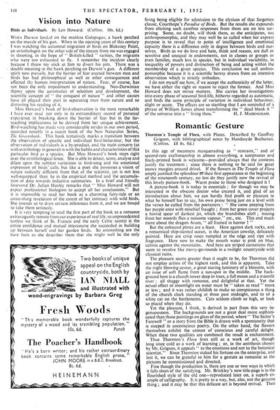Vision into Nature
Birds as Individuals. By Len Howard. (Collins. 10s. 6d.)
WHEN Dai win landed on the manless Galapagos, a hawk perched on the muzzle of his gun. When in the opening years of this century 1 was watching the autumnal migration of birds on Blakeney Point, an ornithologist on the other side of the stream from me was engaged in shooting, in the hope of" British-killed " rarities, the migrants who were too exhausted to fly. I remember the incident clearly because I threw my stick at him to divert his aim. There was a double meaning in the hawk perching on Darwin's gun. A different spirit now prevails, but the barrier of fear erected between men and birds has had philosophical as well as other consequences and affected the human interpretation of nature. Fear, of course, has not been the only impediment to understanding. Neo-Darwinian theory upon the automatics of selection and development, the scientific concept of " the conquest of nature" and other causes have all played their part in separating man from nature and so distorting his reading of it.
Miss Howard's book of bird-observation is the most remarkable I have ever read, not only in its extraordinary record of personal expel ience in breaking down the barrier of fear but in the far- reaching implications to be derived from her unique achievement. Bird-watching has made very considerable strides in our own period, recorded notably in a recent book of the New Naturalist Series, The Greenshank. This book tentatively marks a transition between the observation of specific and individual bird-behaviour, but the observation of individuals is a by-product, and the main concern (as with ornithology in general) is with the habits and characteristics of this particular bird as a species. But Miss Howard's book steps right over the ornithological fence. She is able to detect, score, analyse and dilate upon the subtlest variations in bird-song and the emotional expression of birds' calls, but like a poet she possesses a vision of nature radically different from that of the scientist, yet is not less well-equipped than he in the empirical method and the accumula- tion of data towards inductive summaries. In a brief and friendly foreword Dr. Julian Huxley remarks that " Miss Howard will not expect professional biologists to accept all her conclusions." But it is impossible to read her book as a charming fairy-tale or an astonishing revelation of the extent of her intimacy with wild birds. She intends us to draw certain inferences from it, and we are bound to take them seriously.
It is very tempting to read the first part of the book as a romance extravagantly remote from our experience of real life, so unprecedented (unless we think of St. Francis and the early Celtic saints) is the entire confidence and mutual intercourse she succeeded in building up between herself and her garden birds. So astonishing are the bare facts as she describes them that she might well be the only
living being eligible for admission to the elysium of that forgotten classic, Courthope's Paradise of Birds. But the results she expounds from eliciting such carefree responses from them are no less sur- prising. Some, no doubt, will think them, as she anticipates, too anthropomorphic, and they may well be so called when her express purpose is to reveal that in point of intelligence and emotional capacity there is a difference only in degree between birds and our- selves. Birds as we do love and hate, think and reason, are dull or sensitive and unequal in endowments, not in classes or groups or even families, much less in species, but in individual variability, in inequality of powers and distinction of being and acting within the membership of a given species. This conclusion we call anthro- pomorphic because it is a scientific heresy drawn from an intensive observation which is strictly orthodox.
I do not myself see how, if we accept the authenticity of the latter, we have either the right or reason to reject the former. And Miss Howard does not mince matters. She carries her investigations into every phase of seasonal bird-life, hitherto regarded as automatic, and finds the same principle of variation in individual behaviour, slight or acute. The effects are so startling that I am reminded of a phrase of William James about transforming the " dead blank it "
of the universe into a" living thou." H. J. MASSINGHAM.


































 Previous page
Previous page